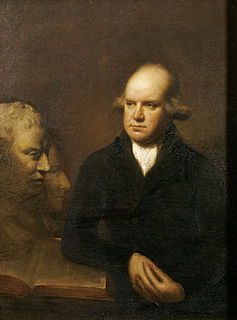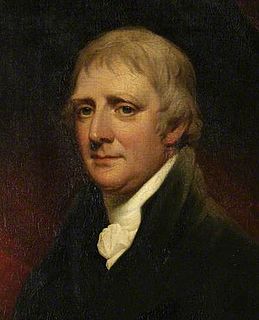This article needs additional citations for verification .(August 2019) |
Sir John Croft, 4th Baronet, was the son of Sir Archer Croft, 2nd Baronet and Frances Waring. He died at Bath, Somerset on 4 December 1797, [1] without legitimate issue.
This article needs additional citations for verification .(August 2019) |
Sir John Croft, 4th Baronet, was the son of Sir Archer Croft, 2nd Baronet and Frances Waring. He died at Bath, Somerset on 4 December 1797, [1] without legitimate issue.
He succeeded to the title of 4th Baronet Croft, of Croft Castle, County Hereford on 30 November 1790 upon the death of his brother, Sir Archer Croft, 3rd Baronet Croft, who had died without male issue.

Baron Farnham, of Farnham in the County of Cavan, is a title in the Peerage of Ireland. It was created in 1756 for John Maxwell, who had previously represented Cavan Borough in the Irish House of Commons. John Maxwell's son, the second Baron, was created Viscount Farnham in 1760 and Earl of Farnham in 1763. Both titles were in the Peerage of Ireland but became extinct when he died childless in 1779. His brother and successor, the third Baron, was again created Viscount Farnham in 1781 and Earl of Farnham in 1785. These titles were also in the Peerage of Ireland. His son, the second Earl, sat in the House of Lords as an Irish Representative Peer from 1816 to 1823. However, he had no children and on his death in 1823 the viscountcy and earldom became extinct.

Baron Croft, of Bournemouth in the County of Southampton, is a title in the Peerage of the United Kingdom. It was created on 28 May 1940 for the Conservative politician Sir Henry Page Croft, 1st Baronet. He had already been created a baronet of Knole in the Borough of Bournemouth in the County of Southampton in the Baronetage of the United Kingdom on 28 February 1924. Croft was the grandson of Reverend Richard Croft, third son of Dr. Sir Richard Croft, 6th Baronet, of Croft Castle. As of 2010 the titles are held by the first Baron's grandson, the third Baron, who succeeded his father in 1997.

Herbert Croft (1603–1691) was an English churchman, bishop of Hereford from 1661.

Sir Herbert Croft, 5th Baronet, English author best known for his novel Love and Madness.

There have been three baronetcies created for persons with the surname Croft, one in the Baronetage of England and two in the Baronetage of the United Kingdom. All three creations are extant as of 2008.

Sir Richard Croft, 6th Baronet was an English physician to the British Royal Family and was the obstetrician to Princess Charlotte who became famous due to his role in "the triple obstetrical tragedy" of 1817.

The Chaytor family is an English gentry family on which has been conferred two baronetcies, one in the Baronetage of England and one in the Baronetage of the United Kingdom and several knighthoods. As of 2008 one baronetcy is extinct.

There have been eight baronetcies created for persons with the surname Wilson, one in the Baronetage of Ireland and six in the Baronetage of the United Kingdom.

The Dixie Baronetcy was created in the Baronetage of England at the time of the Restoration of the Monarchy in 1660 for Sir Wolstan Dixie (1602–1682), a supporter of King Charles I during the English Civil War and afterwards. He was descended from a brother of Sir Wolstan Dixie, the sixteenth century Lord Mayor of London who founded the Dixie Professorship of Ecclesiastical History in the University of Cambridge. Their home was Bosworth Hall near Market Bosworth in Leicestershire. The title became extinct with the death of the thirteenth Baronet, another Sir Wolstan Dixie, in 1975.

Sir Herbert Croft, 1st Baronet was a British politician.

Sir Archer Croft, 2nd Baronet, of Croft Castle, near Leominster, Herefordshire, was a British politician who sat in the House of Commons from 1722 to 1734.
Thomas Archer was an English politician who sat in the House of Commons in 1659 and 1660. He fought in the Parliamentary army in the English Civil War.
There have been two Cook Baronetcies. This first was created in the Baronetage of England in 1663 and went extinct in 1708. The second was created in the Baronetage of the United Kingdom in the 19th century and is extant.

Sir Thomas Kitson was a wealthy English merchant, Sheriff of London, and builder of Hengrave Hall in Suffolk.

Sir Herbert George Denman Croft, 9th Baronet, DL, was an English Conservative Party politician who sat in the House of Commons from 1868 to 1874.
Sir John Archer (1598–1682) was an English judge.
Sir John Gell, 2nd Baronet was an English politician who sat in the House of Commons at various times between 1654 and 1689.
John Croft may refer to:
William Archer, of Coopersale, in Theydon Garnon, Essex, and Welford Park, Berkshire, was an English lawyer and Tory politician who sat in the House of Commons from 1734 to 1739.

Sir Walter Wrottesley, 3rd Baronet (c.1659–1712), of Wrottesley Hall, then in Tettenhall, today Perton, in Staffordshire, England.